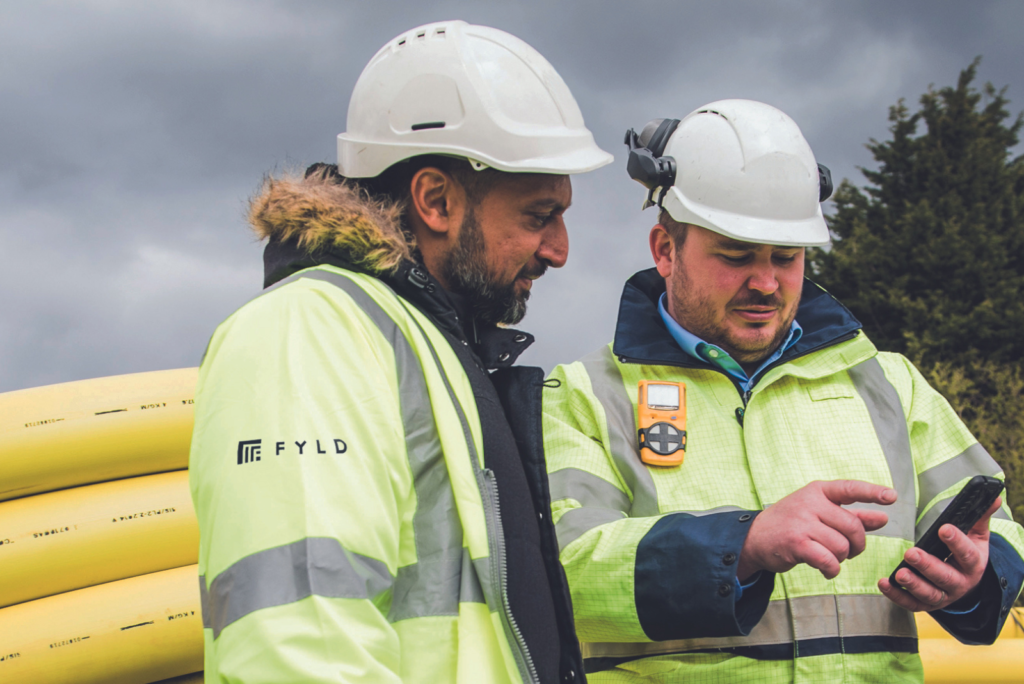Hidden benefits: the systematic impacts of FYLD are felt deep within its customer organisations
It can often be tricky to quantify the intangible impact of technology on our day-to-day operations, or to fully understand the changes to our systems and processes brought about by clever software. Not in the case of FYLD.
FYLD is creating a step change in the way organisations manage field operations and achieving productivity gains of 7-9% and a 30% uplift in safety interventions for customers across multiple industries, in the US and UK.
As the only intelligent field service management tool of its kind, FYLD has been designed by fieldworkers for fieldworkers and has been deployed to thousands of users across multiple utilities and infrastructure companies since its inception. Rather than simply digitising paper-based risk assessments, FYLD uses powerful AI technology to transform daily field team operations to improve personal and process safety, create real-time visibility for remote teams and ultimately improve network performance while driving down operational costs.
Here are four ways that FYLD creates long lasting change deep within its customer organisations to drive safety, productivity and operational efficiency.

- Create behavioural change towards risk through visual acknowledgment of controls and hazards
A core feature of FYLD is its Visual Risk Assessment (VRA) tool which empowers field operators to create point of work risk assessments through video and audio recordings on site. Field operators record evidence of the site and document any hazards and controls, and the FYLD platform’s AI technology then suggests additional ones based on historic jobs of a similar nature. The resulting risk assessment is passed by the field operator to a remote manager for instant review through the platform.
Health and Safety Advisor at Galliford Try, Greg Morgan, has noticed a change in the behaviour of his field crews since adopting FYLD. “FYLD takes the risk assessment and method statement process into the modern age. I have noticed a change in language by those using the VRA function in that they now look for and talk about hazards, and therefore are acknowledging the hazard’s presence.”
By omitting the traditional approach of a paper checklist and instead empowering field crews to record and evidence risk in a shareable format, there is increased awareness to risks on site.
2. Aid the communication between teams and third parties by standardising the language
FYLD is a powerful AI platform, meaning it uses machine learning technology to gather data from every job and builds an enormous database of learnings, enabling the platform to generate suggestions to aid field teams. From spotting hazards missed in VRAs and prompting the team to add this to the risk assessment, to suggesting control measures successfully deployed in previous similar jobs, FYLD provides informed assistance to strengthen the process of risk review.
To perform this function correctly, FYLD requires standardisation of language. As the central communication tool for all parties on the job, FYLD quickly results in a standardised language set.
Global Corporate Health, Safety and Wellbeing Director at Ferrovial, Ben Legg commented, “Digital solutions like FYLD are like the bridge between corporate and operational teams within a company. Communicating laterally across an organisation enables comprehensive and stronger connections – all adding value to the front-line operational work, while keeping the workforce and public safe.”
3. Measure performance and let the data inform decisions
FYLD gathers a huge amount of data, but it is carefully configured to each organisation, ensuring the information which is most important to individual processes and regulatory reporting are presented in an easy-to-use manager’s dashboard.
FYLD presents key data and deeper insights enabling managers to track performance over time, spot trends and use the data to make informed decisions. From expected job duration to the best skillsets for the job, the machine learning capabilities of FYLD assist managers in the future planning of work schedules.
You can learn more about FYLD’s machine learning capabilities here.
4. Take a holistic view of operations
The reporting controls and workflow planning tools mentioned above all help on a day-to-day level, but the data provided by FYLD can also be used to deploy big picture thinking within an organisation.
With deeper data at their fingertips, managers can build a clearer understanding of their team’s strengths and weaknesses, typical job blockers and the issues leading to job delays and worker fatigue.
Martin Holloway, Executive Operations Director at SGN commented, “This step change in digitised functions is only possible with a comprehensive, intuitive platform like FYLD. AI and machine learning is a saviour for operational efficiency.”
A ‘big picture’ view of operational activity, through a digital platform like FYLD, can be hugely beneficial as to how safety, productivity and operations continually improve within an organisation.
FYLD powers productivity
Ultimately, the impacts of adopting FYLD run deeper than simply digitally recording risk assessments and evidencing sites. The behaviour changes it evokes and the workforce data it acquires are the secret to implementing long lasting change to realise improved safety and efficiency in field operations. As managers shift from a reactive way of working, responding to a never-ending stream of phone calls, into a proactive approach focusing their attention on the right sites to drive the day’s operations to successful completion, spans of control improve, and job durations shorten. All without any old-world style trade-offs between safety, productivity and quality.
To find out more about how FYLD can help power productivity for your business or organisation, get in touch today.






